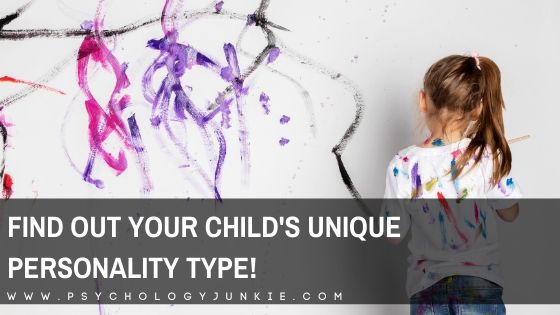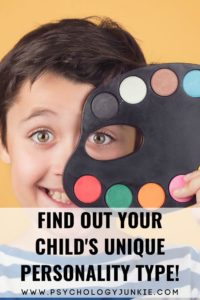Children’s Myers and Briggs Themed Questionnaire!
Want to find out your child’s Myers-Briggs style personality type? Today we’re going to explain how you can de-code your child’s personality type and understand them on a deeper and more meaningful level. You’ll explore where your child’s energy goes, why they make decisions the way they do, and why they’re a procrastinator (or not!). You can read this article to determine your child’s type, or you can take our new questionnaire!

Click Here to Take the children’s 16-personality questionnaire!
Where Your Child’s Energy Goes
Does energy seem to flow from your child like steam from a kettle? If your child is an extrovert, then they focus their energy on the world around them. They are typically more observant to their surroundings than introverts are and eager to interact with their surroundings. They want to use the things in their vicinity, talk to the people in their vicinity, or simply merge with the environment around them.
Extroverted children are more likely to:
- Think out loud
- Talk to themselves
- Jump right into activity (unless they are shy)
- Learn by doing
- Look around them for activity to participate in
- Respond quickly to a question
- Act, then think (or think while taking action)
- Be energized by activity
Does your child’s energy seem to flow inwards? Do they seem to be hoarding it to themselves – taking it with them to their rooms or soaking it into their mind? If your child is an introvert, then they focus their energy on the world inside themselves. They are typically more reflective, reserved, and quiet – although they can have moments of action and exuberance like any child. They do their best thinking alone and find it hard to focus when there are people around.
Introverted children are more likely to:
- Think quietly, without speaking
- Need to get away to solve problems
- Feel drained by prolonged activity
- Observe from the outside before interacting with something
- Pause before answering a question
- Consider an idea quietly before talking about it
- Feel irritable around a lot of stimulation
Take the questionnaire!
The Information Your Child Prioritizes
We all absorb information in different ways. Some look to facts, details, and things they can observe with their senses (Sensing types), while others look for symbols, patterns, and abstract possibilities (Intuitives).
The sensing child appears down-to-earth and filled with common-sense. Every child has an imagination, but the sensing child is more likely to pretend things like “House” or “Doctor” than something drawn completely from the abstract world. They are usually observant to details and focused on the present moment.
Sensing children are more likely to:
- Want step-by-step directions
- Tell a story from the beginning to the end in a linear fashion
- Want concrete examples for how things work
- Focus on the details of the present moment
- Notice when something in their environment changes
- Realize their physical needs and desires quickly
- Notice things like hunger and thirst quickly
- Like things specific and measurable
- Like knowing how things work and learn from hands-on experience
- Want to know how to use something
- Worry about the specific details of their appearance or environment
The intuitive child appears imaginative and lost in ideas. While they can interact with the world around them, they’re mostly interested in what the world around them can help them to imagine. A rock becomes a dragon and a rainbow becomes a passageway to an alternate reality. They are usually observant to hidden meanings and focused on future possibilities.
Intuitive children are more likely to:
- Focus on concepts and theories
- Draw random connections between things
- Notice patterns
- Act based off hunches or inspirations
- Tell a story that is more roundabout, tying in connections and patterns
- Want to be given the end goal rather than step-by-step directions
- Imagine doing things in the future at the expense of doing them now
- Get bored in discussions about day-to-day events and activities
- Dislike limits and doing things the way “they’ve always been done.”
- Have an existential crisis
Take the questionnaire!
How Your Child Makes Decisions
When it comes to important decisions, we all have a preferred way to analyze things. If your child is a thinking type then they try to step out of the situation to look at it objectively. What are the facts? What are the pros and cons? What’s the cause and effect of the various options? What’s the truth? What’s efficient or advantageous?
Thinking children are more likely to:
- Enjoy problem-solving
- Be blunt at the expense of people’s feelings
- Value fairness and truth over empathy and tactfulness
- Be straightforward and direct in their speech
- Seek achievement, either outside of themselves, or within
- Look at things objectively
- Value and notice facts
- Argue
- Critique before praising
Feeling children step into a situation before they make a decision. They want to know how everyone will feel and what’s important to each person. They look at the meaning of the problem rather than the facts of the problem. They’re more likely to tailor their speech to evoke the desired response from the people around them.
Feeling children are more likely to:
- Enjoy supporting and affirming people
- Praise before critiquing
- Value tactfulness and empathy before truth and directness
- Present information they feel the listener wants to hear
- Try to understand how people are affected
- Use values to decide
- Avoid confrontation and conflict
- Take criticism personally
Take the questionnaire!
How Your Child Interacts with Their Environment
Are you a creative procrastinator or a methodical rule-follower? While there are nuances in each type, there are certain trends that people follow when responding to their environment.
Perceiving types like an open, exploratory approach to life. They want to experiment with all their options before settling on a decision. Closure and finality can stress them out because they crave freedom to such a great degree. They are usually innovative and adaptable, but more likely to fall prey to procrastination than Judging types.
Perceiving children are more likely to:
- Push against boundaries because they feel stifled
- Put off deadlines and decisions
- Mix work with play rather than finishing a project in one sitting
- Be adaptable and flexible
- Crave freedom and spontaneity
- Cram to finish homework at the deadline
- Get excited by change
- Talk about their ideas and perceptions more than their decisions
Judging types like having closure and finality in their decisions. Leaving things undecided for too long causes them stress because they don’t know how to channel their thoughts and plans. These children like knowing what’s going to happen and when. They are usually reliable and aware of the rules of their environment. They tend to feel responsible for their environment, either through organizing and making it efficient (TJ types) or creating harmony and unity (FJ types). They tend to finish projects ahead of time, but in their rush they may miss out on creative nuances.
Judging children are more likely to:
- Work best when they have a clear plan
- Feel more relaxed when a decision has been made
- Complete one project before beginning another
- Follow a schedule
- Get stressed by a deadline and finish ahead of schedule
- Feel responsible for what’s happening around them
- Talk in order to come to a decision
- Crave a clear, vivid picture of what’s going to happen
Take the questionnaire!
Find Out Your Child’s Personality Type!
We have just completed a new questionnaire for parents. This questionnaire can help you to narrow down your child’s type. Keep in mind, what you see on the outside may only be a portion of your child’s true personality. If your child is old enough you can let them take this questionnaire themselves (just be aware that the questions are worded from a parent’s perspective).
Find out more about your personality type in our eBook, Discovering You: Unlocking the Power of Personality Type.
Click Here to Take the personality questionnaire!
Other Articles You Might Enjoy:
The Childhood Insecurities of Every Myers-Briggs® Personality Type
Can Childhood Trauma Impact Your Personality Type?
What Your Child Needs to Hear, Based on Their Myers-Briggs® Personality Type
Subscribe to Our Newsletter

Want to discover more about personality type? Get the inside scoop with Susan Storm on all things typological, along with special subscriber freebies, and discounts on new eBooks and courses! Join our newsletter today!














This is an excellent resource! I went through it with my 12 year old and we settled on an mbti type that fits perfectly! Thank you so much!
I’m so glad Mae! It’s so fun to know what your child’s personality type is!